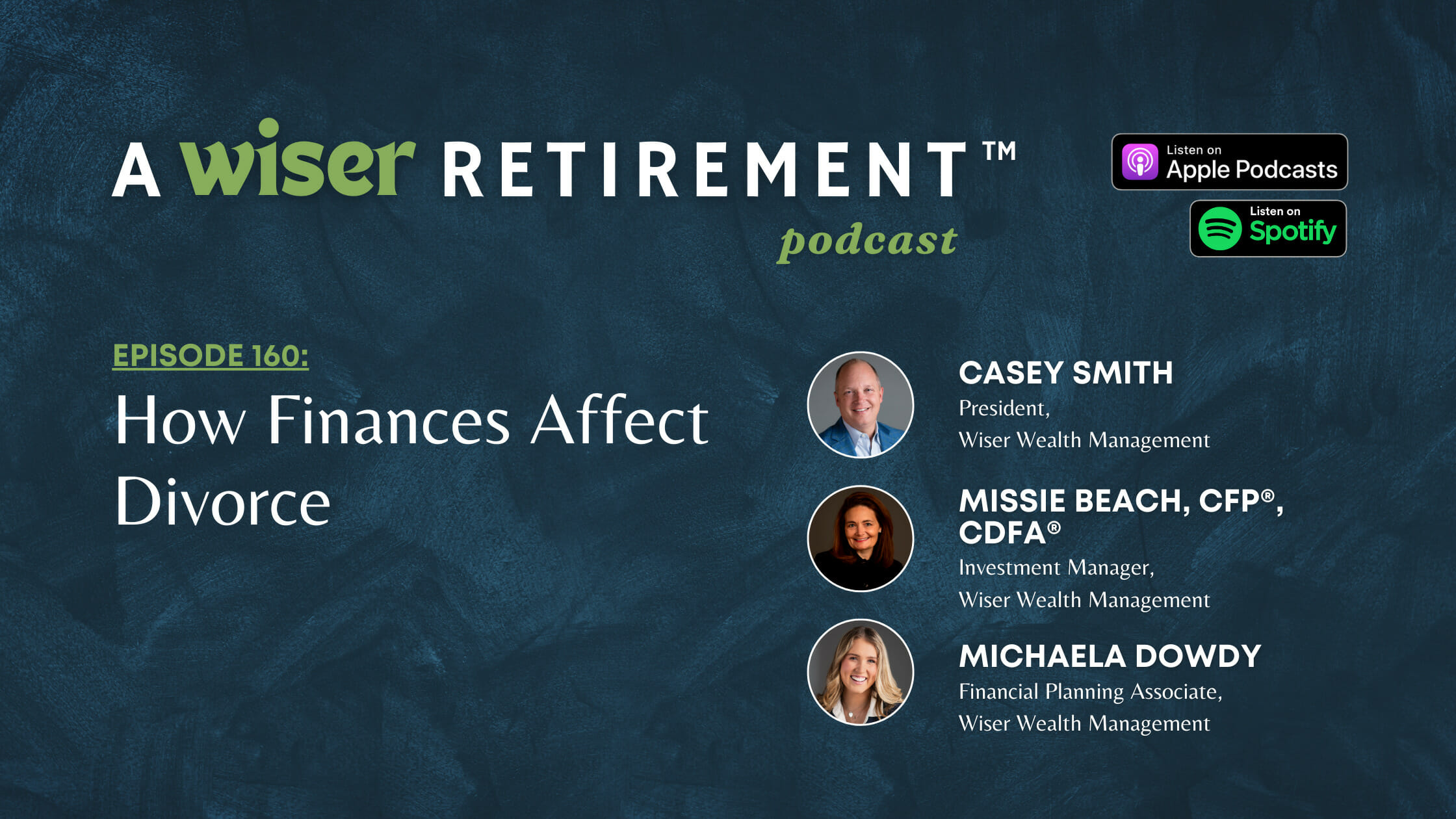
How Finances Affect Divorce
On this episode of A Wiser Retirement™ Podcast, Casey Smith, Missie Beach, CFP®, CDFA®, and Michaela Dowdy, discuss how finances affect divorce. They also talk about things couples can do to avoid heading down the road toward divorce.
Listen on Apple Podcasts or watch on YouTube:
SUMMARY:
The Money Gets Married Too
Nowadays, we see a lot of young couples that get married and keep separate bank accounts. This practice offers a great risk to marriage health overall. However, we can see this justified more if it is your second or third marriage later in life. In those cases, each party comes in carrying their own baggage, which could be a large amount of money or a great amount of debt. For those situations, it might be wise to keep accounts separate. However, for couples who get married with the hope to build a life together, combining finances is a way to grow together, and avoid arguments about money.
Opposing Attitude on How to Handle Money
Since marriage is made of two different people who were raised differently, it’s common for a husband and wife to have opposing views on money. This why money is one of the leading causes of divorce. It’s crucial to align expectations in regards to money with your partner at the beginning of the relationship. This will help avoid arguments and conflicts down the road, which could lead to divorce.
Set Priorities Together
When you don’t have a financial plan in place, there are no set priorities. When priorities are not specified, it is easy to spend on unnecessary things that each party has a different opinion on. Credit cards are definitely a way to make these unnecessary purchases real. This can easily lead to credit card debt accumulation and potential disagreements. We counsel couples to have a joint credit card account where both partners can have access to monthly statements. This way you avoid purchases made without prior communication.
How does your partner feel about debt?
In the same way each person has their own way of dealing with their finances, each person also has a different view on debt. For some, debt is a normal thing, maybe they grew up around it. Some people’s parents had car loans, mortgages, student loans, so that feels normal to them. For others, debt is something they avoid at all costs because that’s what they saw their parents do when growing up. Either way, it is crucial that both partners are on the same page.
We know that problems with personal finance in a marriage can lead to divorce. Our best advice to couples who are getting married, or have been married for a while but are still trying to figure out their finances is to make it a joint purpose. Just as in other aspects of life, working together towards a common goal will bring you closer. It teaches you humility to understand and accept that the way you get there doesn’t really matter as long as you both reach the top together.
Download our eBook on “Buyer Beware: Why do they keep trying to sell you that annuity?”
TIMESTAMPS:
0:00 Intro
2:35 The Money Gets Married Too
07:15 Opposing Attitudes on How to Handle Money
12:10 Set Priorities Together
26:25 How does your partner feel about debt?
LINKS:
Learn more about Casey Smith and Missie Beach, CFP®, CDFA®
CONNECT:
Twitter, Instagram, Facebook, LinkedIn, and YouTube.
Learn more about A Wiser Retirement™ podcast and access previous episodes.
Share This Story, Choose Your Platform!
Wiser Wealth Management, Inc (“Wiser Wealth”) is a registered investment adviser with the U.S. Securities and Exchange Commission (SEC). As a registered investment adviser, Wiser Wealth and its employees are subject to various rules, filings, and requirements. You can visit the SEC’s website here to obtain further information on our firm or investment adviser’s registration.
Wiser Wealth’s website provides general information regarding our business along with access to additional investment related information, various financial calculators, and external / third party links. Material presented on this website is believed to be from reliable sources and is meant for informational purposes only. Wiser Wealth does not endorse or accept responsibility for the content of any third-party website and is not affiliated with any third-party website or social media page. Wiser Wealth does not expressly or implicitly adopt or endorse any of the expressions, opinions or content posted by third party websites or on social media pages. While Wiser Wealth uses reasonable efforts to obtain information from sources it believes to be reliable, we make no representation that the information or opinions contained in our publications are accurate, reliable, or complete.
To the extent that you utilize any financial calculators or links in our website, you acknowledge and understand that the information provided to you should not be construed as personal investment advice from Wiser Wealth or any of its investment professionals. Advice provided by Wiser Wealth is given only within the context of our contractual agreement with the client. Wiser Wealth does not offer legal, accounting or tax advice. Consult your own attorney, accountant, and other professionals for these services.





